Abstract
The effects of loperamide on net solute and water absorption, and prostaglandin E2 (PGE2) and cholera toxin-induced secretion were studied in the rat jejunum using an in vivo steady-state perfusion technique. Loperamide stimulated absorption of fluid, electrolytes, and glucose and reversed PGE2 and cholera toxin-induced secretion to absorption; this opiate analogue had no effect on cholera toxin stimulation of adenylate cyclase activity or the rise of tissue cyclic AMP (cAMP) concentrations. The opiate antagonist, naloxone, reduced the antisecretory effects of loperamide without affecting tissue levels of cAMP. These results indicate that loperamide inhibits PGE2 and cholera toxin-induced secretion, and that this phenomenon is independent of any direct effect that cholera toxin has on the adenylate cyclase system. The action of naloxone suggests, but does not prove, that loperamide exerts its effect via opiate receptors.
Full text
PDF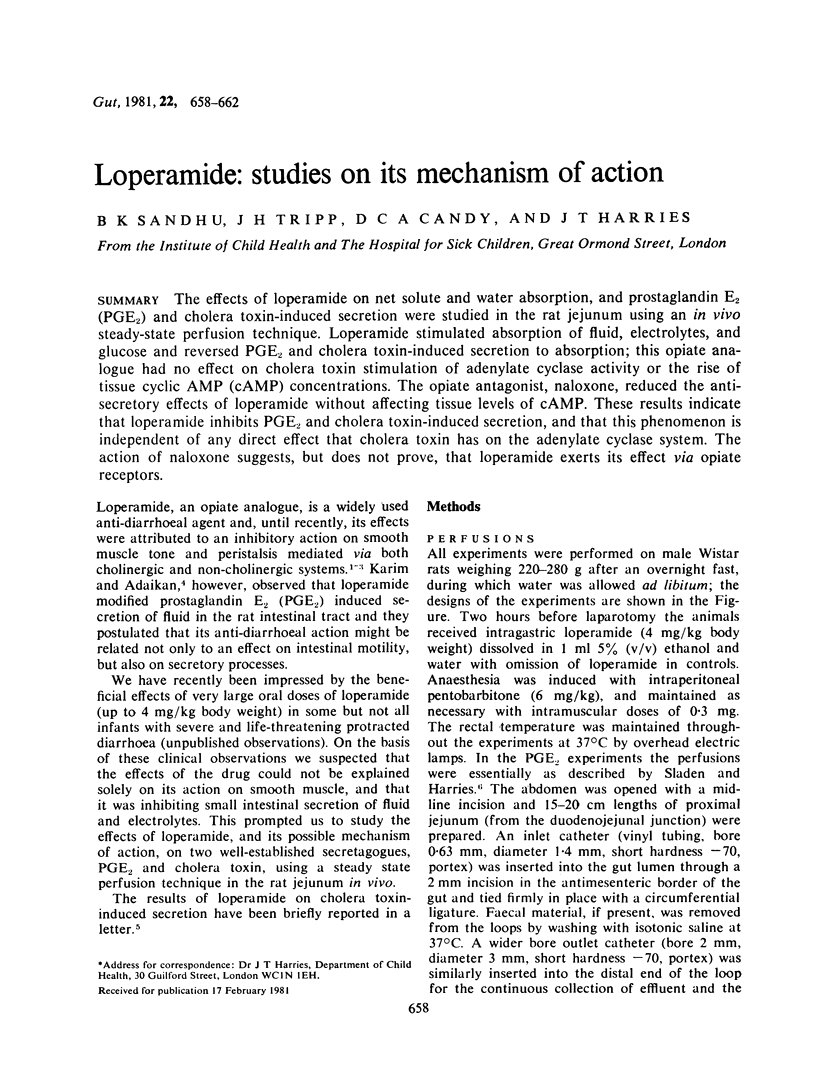
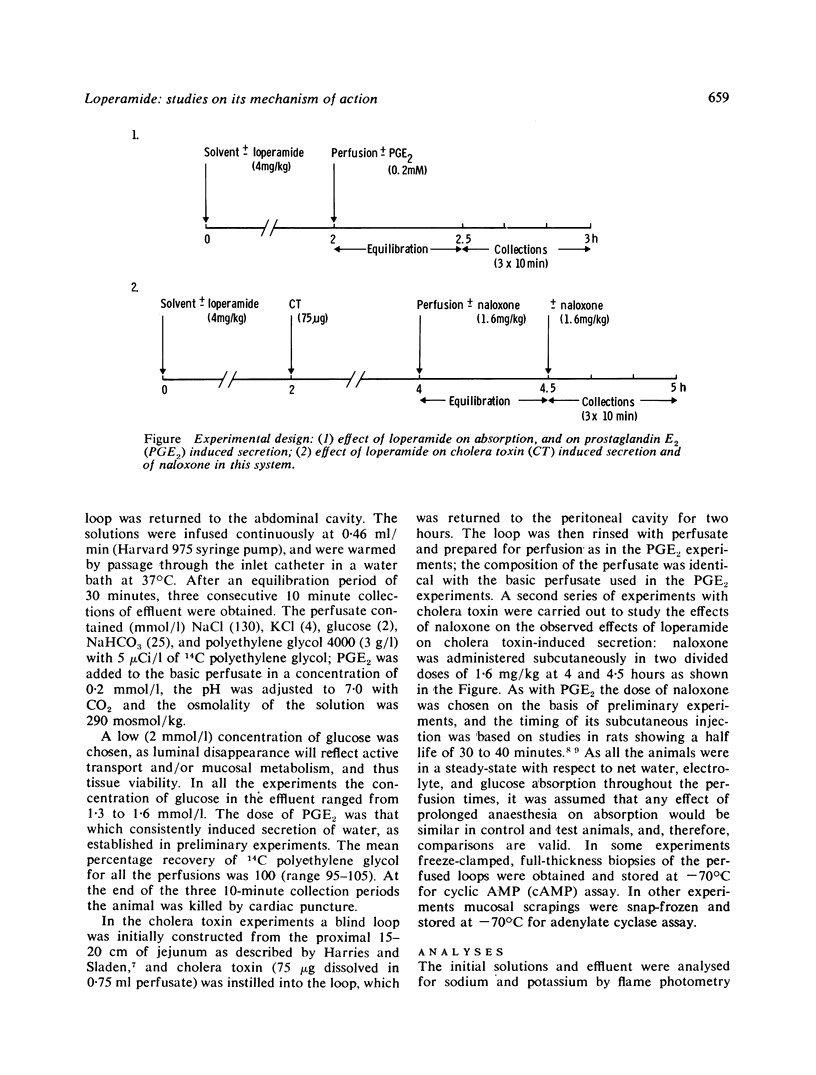
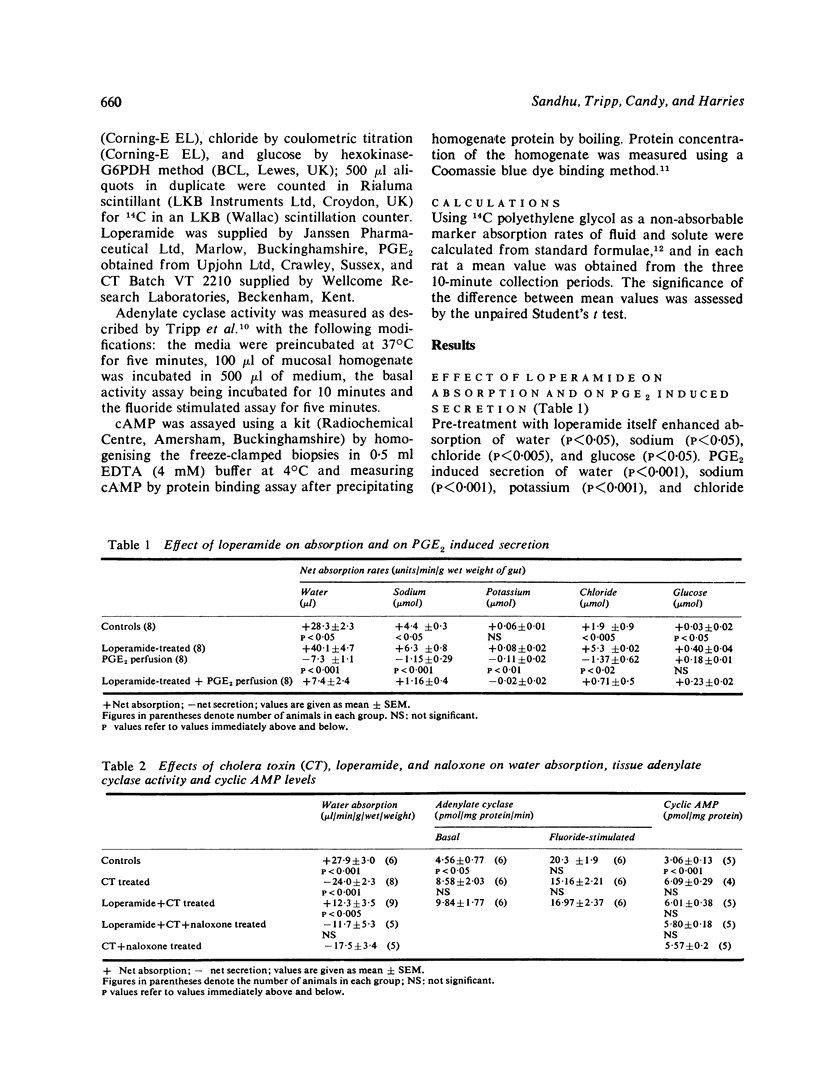
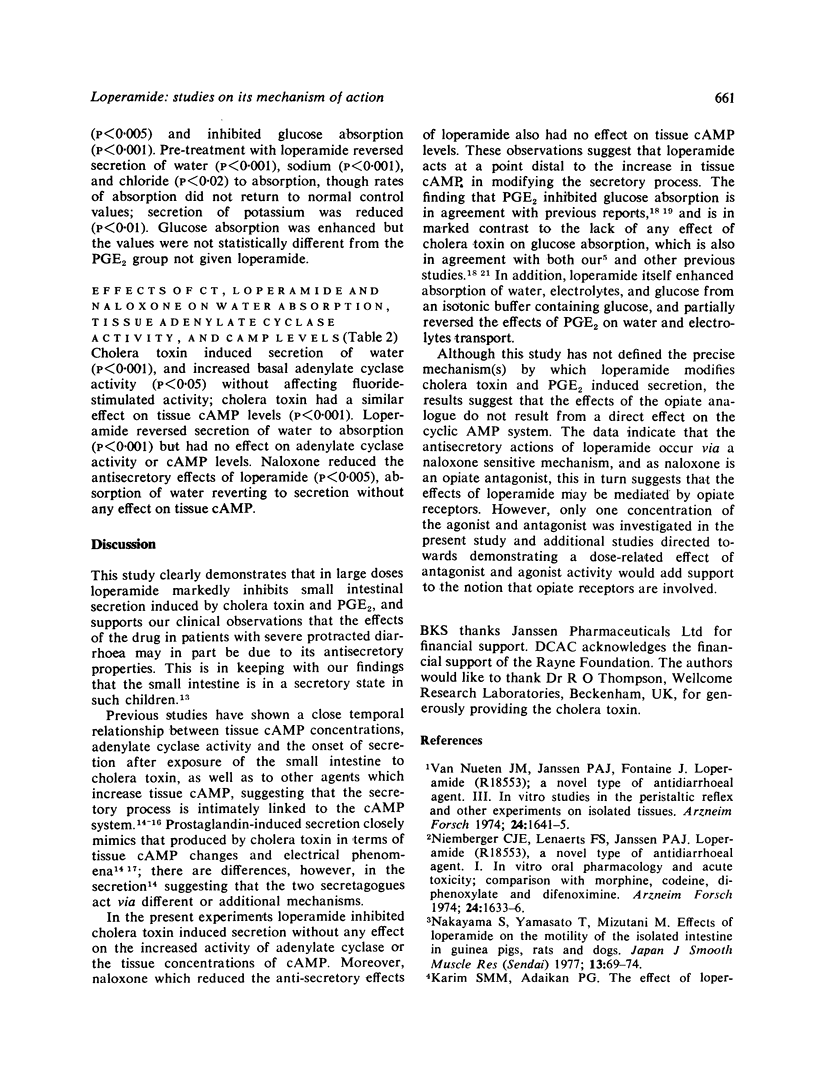
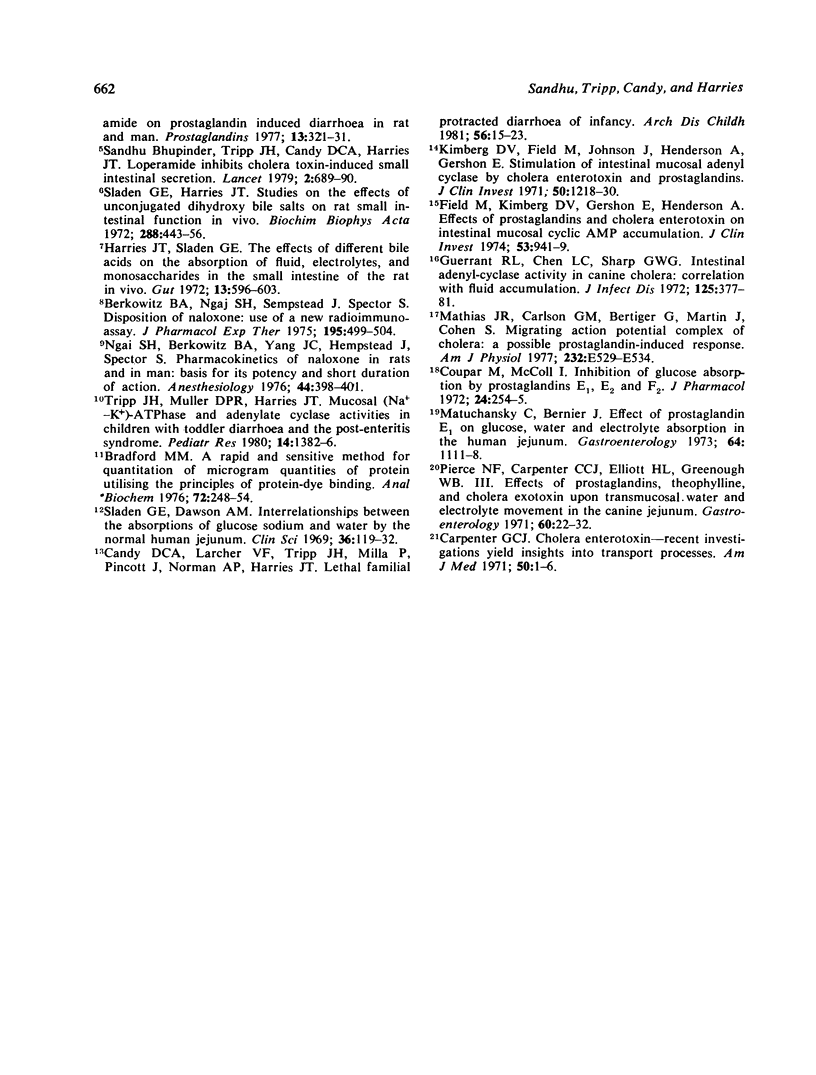
Selected References
These references are in PubMed. This may not be the complete list of references from this article.
- Berkowitz B. A., Ngai S. H., Hempstead J., Spector S. Disposition of naloxone: use of a new radioimmunoassay. J Pharmacol Exp Ther. 1975 Dec;195(3):499–504. [PubMed] [Google Scholar]
- Candy D. C., Larcher V. F., Cameron D. J., Norman A. P., Tripp J. H., Milla P. J., Pincott J. R., Harries J. T. Lethal familial protracted diarrhoea. Arch Dis Child. 1981 Jan;56(1):15–23. doi: 10.1136/adc.56.1.15. [DOI] [PMC free article] [PubMed] [Google Scholar]
- Carpenter C. C., Jr Cholera enterotoxin--recent investigations yield insights into transport processes. Am J Med. 1971 Jan;50(1):1–7. doi: 10.1016/0002-9343(71)90198-7. [DOI] [PubMed] [Google Scholar]
- Coupar I. M., McColl I. Inhibition of glucose absorption by prostaglandins E 1 , E 2 and F 2 . J Pharm Pharmacol. 1972 Mar;24(3):254–255. doi: 10.1111/j.2042-7158.1972.tb08978.x. [DOI] [PubMed] [Google Scholar]
- Guerrant R. L., Chen L. C., Sharp G. W. Intestinal adenyl-cyclase activity in canine cholera: correlation with fluid accumulation. J Infect Dis. 1972 Apr;125(4):377–381. doi: 10.1093/infdis/125.4.377. [DOI] [PubMed] [Google Scholar]
- Harries J. T., Sladen G. E. The effects of different bile salts on the absorption of fluid, electrolytes, and monosaccharides in the small intestine of the rat in vivo. Gut. 1972 Aug;13(8):596–603. doi: 10.1136/gut.13.8.596. [DOI] [PMC free article] [PubMed] [Google Scholar]
- Karim S. M., Adaikan P. G. The effect of loperamide on prostaglandin induced diarrhoea in rat and man. Prostaglandins. 1977 Feb;13(2):321–331. doi: 10.1016/0090-6980(77)90011-9. [DOI] [PubMed] [Google Scholar]
- Kimberg D. V., Field M., Gershon E., Henderson A. Effects of prostaglandins and cholera enterotoxin on intestinal mucosal cyclic AMP accumulation. Evidence against an essential role for prostaglandins in the action of toxin. J Clin Invest. 1974 Mar;53(3):941–949. doi: 10.1172/JCI107635. [DOI] [PMC free article] [PubMed] [Google Scholar]
- Kimberg D. V., Field M., Johnson J., Henderson A., Gershon E. Stimulation of intestinal mucosal adenyl cyclase by cholera enterotoxin and prostaglandins. J Clin Invest. 1971 Jun;50(6):1218–1230. doi: 10.1172/JCI106599. [DOI] [PMC free article] [PubMed] [Google Scholar]
- Mathias J. R., Carlson G. M., Bertiger G., Martin J. L., Cohen S. Migrating action potential complex of cholera: a possible prostaglandin-induced response. Am J Physiol. 1977 May;232(5):E529–E534. doi: 10.1152/ajpendo.1977.232.5.E529. [DOI] [PubMed] [Google Scholar]
- Matuchansky C., Bernier J. J. Effect of prostaglandin E 1 on glucose, water, and electrolyte absorption in the human jejunum. Gastroenterology. 1973 Jun;64(6):1111–1118. [PubMed] [Google Scholar]
- Nakayama S., Yamasato T., Mizutani M. [Effects of loperamide on the motility of the isolated intestine in guinea pigs, rats and dogs (author's transl)]. Nihon Heikatsukin Gakkai Zasshi. 1977 Jun;13(2):69–74. doi: 10.1540/jsmr1965.13.69. [DOI] [PubMed] [Google Scholar]
- Ngai S. H., Berkowitz B. A., Yang J. C., Hempstead J., Spector S. Pharmacokinetics of naloxone in rats and in man: basis for its potency and short duration of action. Anesthesiology. 1976 May;44(5):398–401. doi: 10.1097/00000542-197605000-00008. [DOI] [PubMed] [Google Scholar]
- Niemegeers C. J., Lenaerts F. M., Janssen P. A. Loperamide (R 18 553), a novel type of antidiarrheal agent. Part 1: in vivo oral pharmacology and acute toxicity. Comparison with morphine, codeine, diphenoxylate and difenoxine. Arzneimittelforschung. 1974 Oct;24(10):1633–1636. [PubMed] [Google Scholar]
- Pierce N. F., Carpenter C. C., Jr, Elliott H. L., Greenough W. B., 3rd Effects of prostaglandins, theophylline, and cholera exotoxin upon transmucosal water and electrolyte movement in the canine jejunum. Gastroenterology. 1971 Jan;60(1):22–32. [PubMed] [Google Scholar]
- Sandhu B., Tripp J. H., Candy D. C., Harries J. T. Loperamide inhibits cholera-toxin-induced small-intestinal secretion. Lancet. 1979 Sep 29;2(8144):689–690. doi: 10.1016/s0140-6736(79)92083-x. [DOI] [PubMed] [Google Scholar]
- Sladen G. E., Dawson A. M. Interrelationships between the absorptions of glucose, sodium and water by the normal human jejunum. Clin Sci. 1969 Feb;36(1):119–132. [PubMed] [Google Scholar]
- Sladen G. E., Harries J. T. Studies on the effects of unconjugated dihydroxy bile salts on rat small intestinal function in vivo. Biochim Biophys Acta. 1972 Nov 2;288(2):443–456. doi: 10.1016/0005-2736(72)90265-9. [DOI] [PubMed] [Google Scholar]
- Tripp J. H., Muller D. P., Harries J. T. Mucosal (Na+-K+)-ATPase and adenylate cyclase activities in children with toddler diarrhea and the postenteritis syndrome. Pediatr Res. 1980 Dec;14(12):1382–1386. doi: 10.1203/00006450-198012000-00025. [DOI] [PubMed] [Google Scholar]
- Van Nueten J. M., Janssen P. A., Fontaine J. Loperamide (R 18 553), a novel type of antidiarrheal agent. Part 3: in vitro studies on the peristaltic reflex and other experiments on isolated tissues. Arzneimittelforschung. 1974 Oct;24(10):1641–1645. [PubMed] [Google Scholar]


